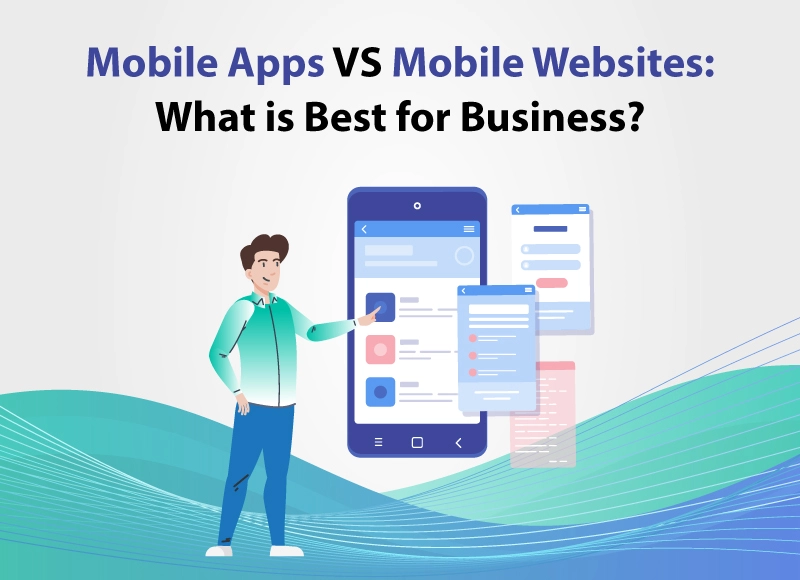Table of Contents
Are you wondering whether to invest in a mobile app or a mobile website for your business? This article breaks down the pros and cons of each to help you make an informed decision.

Making your business profitable and successful is a priority for almost every business. We live in the digital era when the online presence and being visible make it much easier to reach your audience and promote your services or products.
Among the most common options, businesses usually choose to achieve this goal by creating mobile websites or apps. But what is the difference between them, and which one is best for your business? In this article, we will figure it out.
Mobile Websites
What is a mobile website?
A website is a linked mix of HTML, CSS, and JavaScript files software developers create.
Each website has its own set of such files. And when a user opens a website in a browser, files are downloaded via the web browser to the user's device. When files are downloaded, the browser is responsible for "drawing" the website on the device's screen using these downloaded files.
Though if a user has a poor Internet connection, the website won't be displayed as it should. And this is one of the main disadvantages and weaknesses of websites.
What's also important to mention here is that as for web browsing, lots of different devices can be used (e.g., PCs, laptops, tablets, smartphones), and many websites include rules on how the website appearance should change based on the device's screen size & resolution.
A mobile website is just a website that includes UI support for smartphone-sized screens.
Advantages of mobile websites
Mobile websites are compatible with different devices, which means that people can open your website and check all its pages using different devices (which is opposite to mobile apps).
Two of the most important points are search engine optimization and promotion. And a website offers many opportunities in terms of SEO and advertising, which may be a crucial factor for business-driven decisions.
Moreover, websites are easier, faster, and cheaper to develop and maintain than mobile apps. If this is crucial for you, better develop a website for your business
Website development: why it is what you may need
Website development is quite a convenient and fast process. And there are a few reasons why.
First of all, HTML, CSS, and JavaScript (JS) are the essences of any web development. There is simply no alternative for these technologies on the front-end part of the web, which has remained constant for the last 10-15 years.
What does it mean, and why is it good for you as a business owner? First, it means that any web developer is familiar with these technologies by default. And it allows you to find developers faster and easier, and a vast set of open-source codes can be used in your own code.
Why can open-source codes save time and speed up the development process? Because you developers can use some parts of the code from open-source resources instead of writing the entire codebase from scratch.
Also, the environment in which web codes are executed (web browsers) remains largely unchanged. The introduction of most new features in web browsers follows the principle of backward compatibility, ensuring that any codes written before the browser change will still work after.
So if you want to be sure that your website will reliably work in the future, even if browsers get some updates, don't worry. Even in the case of updates or browser changes, the browser will take care of it! And after your development team creates a bug-free website solution, it will continue to work reliably in the future.
If you prefer fast development, the possibility of easier search engine optimization and promotion, and visiting your website from different devices, website development is a great choice for your business.
Before making a final decision, check why a mobile app is even better in your case.
Mobile Apps
What is a mobile application?
Mobile apps are applications that users must install via specific mobile application stores. For example, App Store for iOS or Google Play Market for Android. Or less popular alternatives, like BuildStore for IOS apps or Samsung Galaxy App Store for Android.
Mobile apps run directly by the mobile operating system (OS), which differs from how websites run in the browser. This allows mobile apps to have a broader range of functions and capabilities. For instance, they can access your camera, file system, receive push notifications, and integrate with other installed mobile apps. Additionally, integrating services like Messente can enhance an app's communication capabilities, allowing businesses to send targeted SMS messages and engage customers more effectively.
And again, as websites run in browsers, they have fewer capabilities and are limited to the user's permissions to the browser app.
One more significant difference and one of the main advantages of mobile apps is the possibility to have a more comprehensive "native" look & feel (which can be much smoother in terms of UI/UX and can provide users with a better experience in general).
Another big reason for that is consistent performance. We've already mentioned above that the website's performance highly depends on the Internet connection and its speed. And this can significantly affect user experience. And when talking about mobile apps, there are many ways to smooth out that issue.
For example, by caching (saving) the previously downloaded data. Mobile apps have much more freedom in doing that in comparison to websites.
In addition, mobile apps can be promoted and advertised in the place where they are indexed, which is usually an application store. As for search engine optimization, many SEO-like techniques can be applied to your mobile app in the AppStore/Google Play Market. These actions will rank your app higher in search results.
Types of mobile apps
Mobile apps may be developed for a specific operating system (OS) or both operating systems simultaneously.
The difference between these two types of apps is that the first type needs 2 different codebases for each OS (and both of them should be developed, fixed, and maintained independently). Hence, they are called Native Apps.
And the second type is hybrid mobile apps. They need only one codebase for both operating systems, which decreases OS-specific codes to a minimum.
This saves effort and speeds up the development process and a significant amount of money, as your developers need to write only one codebase that will be used for both operating systems.
Native mobile apps
The native app is an app that is developed for a specific mobile operating system (either Android or iOS).
Native apps use platform-specific programming tools and components provided by the OS itself and strictly follow UX approaches declared by the OS. Therefore, the code should be written separately for each operating system if you want support for both platforms.
Hybrid mobile apps
A hybrid app has one codebase for both operating systems and is a mix of native and web technologies.
Such apps usually have a basic native app as a wrapper, which is connected to the web part of the app. With that connection, the web part of the app can use any platform-specific tools and features. So if you want your mobile app to run on any device, a hybrid mobile app is exactly what you need.
Consequently, one of the main advantages of hybrid apps is consistency because they can reach absolutely the same look & feel on Android and IOS.
Furthermore, regarding the development process, hybrid mobile apps are faster
to develop than native apps due to having a single codebase for both platforms.
In the end, to get smoother performance and provide users with a better experience, consider getting a native or hybrid mobile app for your business.
Mobile Website vs. Native Mobile App vs. Hybrid Mobile App
To help you make a final decision and understand what is better for your business, we prepared a comparison table with the main points you need to focus on before you start developing a website or mobile app for your business.
Summing up
To decide what will be best for your business: a website, native mobile app, or hybrid mobile app, take into account all the points we described above.
Consider what is more important for you to make this decision. If this is cost-effective, then choose a website. If you want a mobile app that will be high-performant, more secure, and possible to work without an internet connection, choose a mobile app. Though hybrid mobile apps are developed faster than native apps, it is worth choosing a hybrid mobile app over a native app if a decisive factor is a time.
So, consider all the pros and cons, and your business goals, evaluate each option, and turn your idea into reality!







